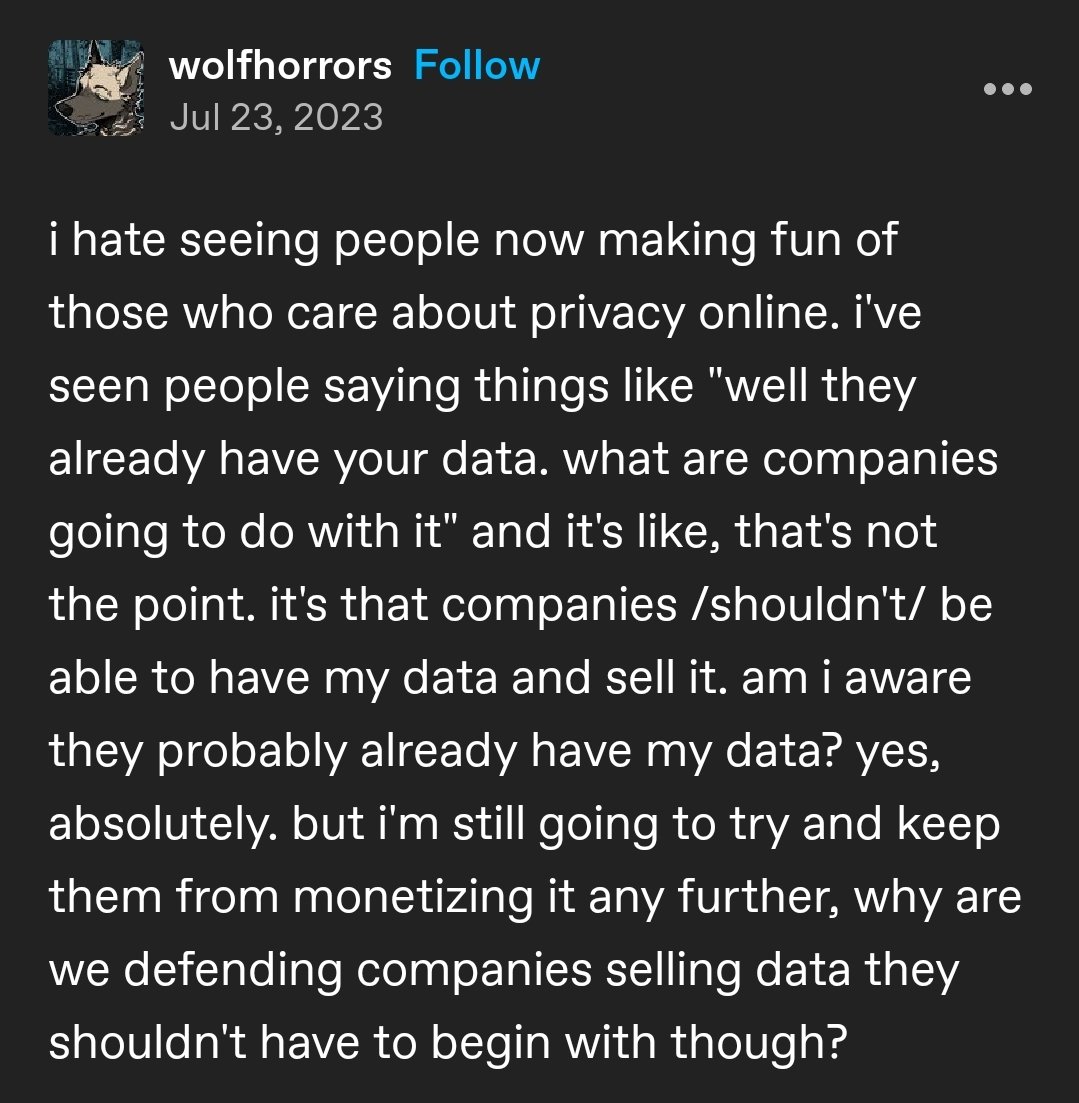this post was submitted on 24 Nov 2024
999 points (98.9% liked)
Privacy
32784 readers
1393 users here now
A place to discuss privacy and freedom in the digital world.
Privacy has become a very important issue in modern society, with companies and governments constantly abusing their power, more and more people are waking up to the importance of digital privacy.
In this community everyone is welcome to post links and discuss topics related to privacy.
Some Rules
- Posting a link to a website containing tracking isn't great, if contents of the website are behind a paywall maybe copy them into the post
- Don't promote proprietary software
- Try to keep things on topic
- If you have a question, please try searching for previous discussions, maybe it has already been answered
- Reposts are fine, but should have at least a couple of weeks in between so that the post can reach a new audience
- Be nice :)
Related communities
much thanks to @gary_host_laptop for the logo design :)
founded 5 years ago
MODERATORS
you are viewing a single comment's thread
view the rest of the comments
view the rest of the comments

This is as unconvincing an analogy as , and for the same reason.
, and for the same reason.
Unconvincing to whom? That campaign did an amazing job of equating copyright to property ownership for an entire generation.
It’s not accurate, but I think we’ve seen that it can be very convincing for most people.
I wouldn’t recommend trying to trick people into caring about their privacy: it’s not good for your reputation or your long-term relationship with them.
I would recommend it. People need to be manipulated into doing the right thing.
Ah, yes, the ends justify the means, Dr. Mengele
It does.
Edit: If I would manipulate the German people into not electing Hitler that would make me akin to Mengele?
Manipulation only really works so far as it's actually grounded in something. Like, sure, that sounds epic and evil and a machiavillanous type of thing, but it's usually just easier straight up to actually come up with a compelling argument that "manipulates" people into seeing it from a real angle, than to have to try to do backflips in order to come up with some totally fake argument that isn't real but also appeals to them specifically and slots into their worldview and directs them where you want them to go. It's easier just to start with the reality of the situation and your authentic belief and then come up with a package for that which they will find acceptable.
At that point, where you're actually basing your argument in something, "manipulation" becomes "framing". We move from a false construction, to just selling a new angle on the reality. Maybe that's the same thing, to you, but there's definitely a meaningful difference there.
In this case, the false construction is the idea that data is similar to property, and you need to own your property rather than give it away. Sure, this might push people in the right direction, but they're also just as likely to find it acceptable to trade their property for a service (as is what these social media companies do, if the metaphor was extended), or to sell their property for a return in a more straight kind of way.
Then you start getting into problematic ideals where people prize their art for its economic returns and hate AI (or stable diffusion) for "stealing" from them. For "stealing" their "intellectual property", and for stealing potential economic value they could've extracted out of that. This, rather than hating it for being a huge investor level scam, that tarnishes the core technology's viability, for being massive undirected energy drain, and for enabling mass internet botting more than what we already had.
It's better to deconstruct the idea of intellectual property, while also advocating for user privacy as a kind of right that exists, and actually gives something or does something useful to those which have it, those which have real privacy. Selling it as something good for the individual, to the individualist, selling it as good for society, to the collectivist.
Beyond that, if you're arguing against someone who believes in the market, and in this sort of meritocratic lassiez-faire intellectual utopian cyberspace ideal, then that's the real core of the issue you must solve, rather than getting into this privacy/intellectual property debate, where it's impossible to really change their minds because their core values are incompatible with the idea itself.
How is that any different than what all those shady companies do?
The result differs.
Which generation is that? I'll be honest, I've yet to talk to someone who really gives a crap about where the content they're consuming is coming from. Hell, most people I've dealt with don't give a crap about content being pirated whenever it happens to be the more convenient option.